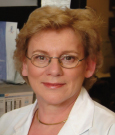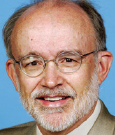The American Society for Radiation Oncology (ASTRO) has announced the names of three recipients of the Society’s highest honor, the ASTRO Gold Medal. Mary K. Gospodarowicz, MD, FASTRO, Leonard L. Gunderson, MD, MS, FASTRO, and Nancy J. Tarbell, MD, FASTRO, will receive the ASTRO Gold Medal during the Awards Ceremony on September 16, 2014, at ASTRO’s 56th Annual Meeting in San Francisco.
ASTRO’s Gold Medal is bestowed annually on esteemed ASTRO members who have made exceptional contributions to the field of radiation oncology, including work in research, clinical care, teaching and service.
“Congratulations to my distinguished colleagues, Drs. Gospodarowicz, Gunderson, and Tarbell for being recognized with the ASTRO Gold Medal,” said ASTRO Chair Colleen A.F. Lawton, MD, FASTRO. “They have each greatly impacted the field of radiation oncology through their research, clinical work, and passion for providing high-quality care. Their contributions to our specialty will continue to improve the lives of cancer patients worldwide.”
Mary K. Gospodarowicz, MD, FASTRO
Dr. Gospodarowicz is a radiation oncologist at Princess Margaret Cancer Centre in Toronto and a 33-year ASTRO member who has had a major impact on several areas of radiation oncology, including the treatment of malignant lymphomas and genitourinary cancers, global health, and the use of radiation treatment worldwide, and the mentoring of trainees.
“My career has been very eclectic, and to be recognized by my peers and colleagues is extremely meaningful,” Dr. Gospodarowicz said. “Throughout my career and my roles as clinician, researcher, teacher, administrator and leader, I have focused on promoting radiation therapy as an integral tool for treating cancer patients worldwide.”
Dr. Gospodarowicz’s research has focused on radiation therapy for lymphomas and genitourinary cancers, including prostate cancer, bladder cancer, and seminoma, as well as studies of secondary cancers and other late effects of treatment. Dr. Gospodarowicz and her colleagues at the Princess Margaret Cancer Centre pioneered systematic studies of surveillance in place of routine use of abdominal and thoracic radiation for early-stage seminoma. This change has helped reduce the risk of these patients developing complications and the risk of secondary cancer.
In addition to her research, Dr. Gospodarowicz’s more recent work has focused on global health and the role of radiation therapy in treating cancer patients worldwide. She is currently the president of the Union for International Cancer Control (UICC), an international organization dedicated to helping reduce the worldwide cancer burden, promote greater equity in cancer control, and place cancer on the global health and development agenda. In this role, Dr. Gospodarowicz created the Global Task Force on Radiotherapy for Cancer Control (GTFRCC) to determine what it would take to close the gap between what exists today and equitable access to radiotherapy for cancer globally.
Dr. Gospodarowicz is the Medical Director of the Princess Margaret Cancer Centre at the University Health Network in Toronto and the Regional Vice-President of Cancer Care Ontario.
Leonard L. Gunderson, MD, MS, FASTRO
As a 38-year ASTRO member and former Chair of ASTRO’s Board of Directors (2011-2012), Dr. Gunderson has made significant contributions to radiation oncology through research and clinical practice in gastrointestinal (GI) cancers, as well as service to ASTRO through his dedication to numerous committees and his 9 years serving on ASTRO’s Board of Directors.
“I have had the fortunate opportunity to conduct clinical research and to accomplish scholarly contributions in the area of GI cancers that have significantly impacted patient care,” Dr. Gunderson said.
In the 1970s, Dr. Gunderson published a definitive study, “Areas of failure found at reoperation (second of symptomatic look) following ‘curative surgery’ for adenocarcinoma of the rectum. Clinicopathologic correlation and implications for adjuvant therapy,” in Cancer on the relapse patterns found by second-look surgery in patients treated for rectal cancer. The analysis of this study led to radiation oncologists tailoring radiation fields to the particular sites where disease did recur, rather than estimating where the risk existed.
“It has been a privilege and an opportunity to mentor many residents and staff colleagues within the field of radiation oncology and associated disciplines. I feel strongly about the advantages of a team approach in the triad of patient care, research and education, and in having successful shared-leadership within institutional departments, organizations and families. Effective mentoring helps achieve these goals,” said Dr. Gunderson, an Emeritus Professor and Consultant in the Department of Radiation Oncology at the Mayo Clinic.
Nancy J. Tarbell, MD, FASTRO
Dr. Tarbell, a Radiation Oncologist at Massachusetts General Hospital and 29-year ASTRO member, has had a major influence on pediatric oncology and radiation therapy, and has worked to expand the role of women faculty in radiation oncology and beyond. She specializes in pediatric brain tumors and has made significant contributions in cancer biology and radiation physics.
“I feel fortunate to be able to take care of children with cancer, and I am proud of the multidisciplinary team approach, which has included medical physicists, biologists and clinicians that provided me with the opportunity to help improve the treatment of children with cancer,” she said. “Studying the long-term effects of treatment allowed me to move precision radiation techniques forward.”
An internationally recognized expert in pediatric oncology and radiation therapy, Dr. Tarbell’s research has examined ways to provide curative treatment programs for children with malignant disease and to develop effective strategies to decrease the late effects of treatment. For more than 20 years, Dr. Tarbell has been an active member of the Brain Tumor Committee of the Children’s Oncology Group and served as the principal investigator on medulloblastoma protocols. She is credited with establishing the current standard of care for children with high-risk medulloblastoma.
More recently, her research has focused on the use of proton-beam therapy in pediatric brain tumors and sarcomas, examining the feasibility, effectiveness, and dosimetric and physics aspects of particle radiation therapy. She is a member of the Institute of Medicine of the National Academies of Science.
“I grew up in a house of six girls. This was a wonderful environment for true ‘division of labor’ without gender bias. In addition, I benefited greatly from the mentorship of Sam Hellman, MD, FASTRO, while he was Chair of the Harvard Joint Center for Radiation Therapy. He mentored deeply and intuitively and continues to be an extraordinary leader today. He gave me opportunities when there were few women role models. I hope that I have shared like-opportunities with the many young men and women whom I have taught, particularly women,” said Dr. Tarbell, the Dean for Academic and Clinical Affairs at Harvard Medical School in Boston and the C.C. Wang Professor of Radiation Oncology at Harvard Medical School and Massachusetts General Hospital in Boston. ■




